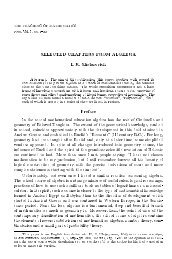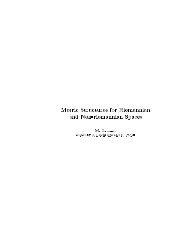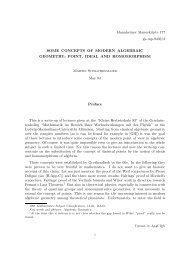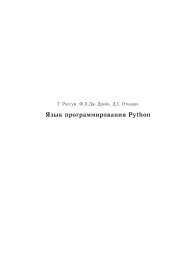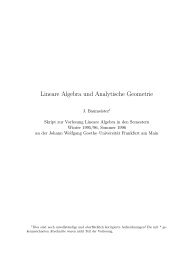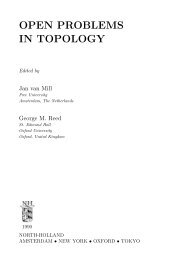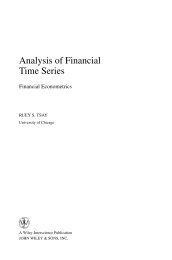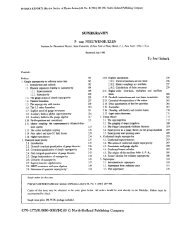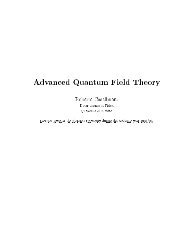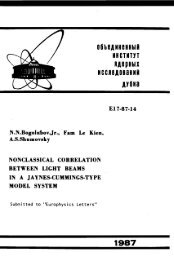- Page 3 and 4:
Also by F. David PeatBlackfoot Phys
- Page 5:
Joseph Henry Press • 2101 Constit
- Page 10 and 11:
PREFACEQue sais-je? (What do I know
- Page 12 and 13:
Preface xiand London saw its first
- Page 14 and 15:
Preface xiiiand, determined to see
- Page 18 and 19:
OneQUANTUM UNCERTAINTYIn 1900 Lord
- Page 20 and 21:
Quantum Uncertainty 3able to the p
- Page 22:
Quantum Uncertainty 5Imagine a gro
- Page 25 and 26:
8 From Certainty to UncertaintyCom
- Page 27 and 28:
10 From Certainty to Uncertaintybl
- Page 29 and 30:
12 From Certainty to Uncertaintypo
- Page 31 and 32:
14 From Certainty to Uncertaintykn
- Page 33 and 34:
16 From Certainty to Uncertaintywr
- Page 35 and 36:
18 From Certainty to Uncertaintyde
- Page 37 and 38:
20 From Certainty to UncertaintyIn
- Page 39 and 40:
22 From Certainty to Uncertaintyne
- Page 41 and 42:
24 From Certainty to Uncertaintyco
- Page 43 and 44:
26 From Certainty to Uncertaintyof
- Page 45 and 46:
28 From Certainty to UncertaintyTh
- Page 47 and 48:
30 From Certainty to Uncertaintywi
- Page 49 and 50:
32 From Certainty to Uncertaintyne
- Page 51 and 52:
34 From Certainty to Uncertaintyli
- Page 53 and 54:
36 From Certainty to UncertaintyGH
- Page 55 and 56:
38 From Certainty to Uncertaintymo
- Page 57 and 58:
40 From Certainty to UncertaintyTh
- Page 59 and 60:
42 From Certainty to UncertaintyMa
- Page 61 and 62:
44 From Certainty to Uncertaintyex
- Page 63 and 64:
46 From Certainty to Uncertaintybu
- Page 65 and 66:
48 From Certainty to Uncertaintyon
- Page 67 and 68:
50 From Certainty to UncertaintyTh
- Page 69 and 70:
ThreeFROM OBJECT TO PROCESSWe are c
- Page 71 and 72:
54 From Certainty to UncertaintyWh
- Page 73 and 74:
56 From Certainty to Uncertaintyco
- Page 75 and 76:
58 From Certainty to Uncertaintyso
- Page 77 and 78:
60 From Certainty to Uncertaintyti
- Page 79 and 80:
62 From Certainty to Uncertaintyto
- Page 81 and 82:
64 From Certainty to Uncertaintywi
- Page 83 and 84:
66 From Certainty to UncertaintyJu
- Page 85 and 86:
68 From Certainty to Uncertaintyde
- Page 87 and 88:
70 From Certainty to Uncertaintyco
- Page 89 and 90:
72 From Certainty to Uncertaintyph
- Page 91 and 92:
74 From Certainty to Uncertaintyim
- Page 93 and 94:
76 From Certainty to Uncertaintypo
- Page 95 and 96: 78 From Certainty to Uncertaintyto
- Page 97 and 98: 80 From Certainty to Uncertaintysi
- Page 99 and 100: 82 From Certainty to Uncertaintyso
- Page 101 and 102: 84 From Certainty to Uncertaintyor
- Page 103 and 104: 86 From Certainty to Uncertaintyme
- Page 105 and 106: 88 From Certainty to Uncertaintypr
- Page 107 and 108: FiveTHE END OF REPRESENTATIONThe pr
- Page 109 and 110: 92 From Certainty to Uncertaintyfl
- Page 111 and 112: 94 From Certainty to Uncertaintyse
- Page 113 and 114: 96 From Certainty to Uncertaintyre
- Page 115 and 116: 98 From Certainty to Uncertaintyun
- Page 117 and 118: 100 From Certainty to Uncertaintya
- Page 119 and 120: 102 From Certainty to Uncertaintyf
- Page 121 and 122: 104 From Certainty to UncertaintyO
- Page 123 and 124: 106 From Certainty to Uncertaintyg
- Page 125 and 126: 108 From Certainty to Uncertaintyo
- Page 127 and 128: 110 From Certainty to Uncertaintym
- Page 129 and 130: 112 From Certainty to UncertaintyY
- Page 131 and 132: 114 From Certainty to UncertaintyI
- Page 133 and 134: 116 From Certainty to Uncertaintyr
- Page 135 and 136: 118 From Certainty to UncertaintyN
- Page 137 and 138: 120 From Certainty to UncertaintyT
- Page 139 and 140: 122 From Certainty to Uncertaintyo
- Page 141 and 142: 124 From Certainty to Uncertaintyr
- Page 143 and 144: 126 From Certainty to UncertaintyW
- Page 145: 128 From Certainty to Uncertaintyd
- Page 149 and 150: 132 From Certainty to Uncertaintyf
- Page 151 and 152: 134 From Certainty to Uncertaintyd
- Page 153 and 154: 136 From Certainty to Uncertaintye
- Page 155 and 156: 138 From Certainty to UncertaintyA
- Page 157 and 158: 140 From Certainty to Uncertaintya
- Page 159 and 160: 142 From Certainty to UncertaintyA
- Page 161 and 162: 144 From Certainty to Uncertaintyi
- Page 163 and 164: 146 From Certainty to UncertaintyO
- Page 165 and 166: 148 From Certainty to Uncertaintyt
- Page 167 and 168: 150 From Certainty to UncertaintyA
- Page 169 and 170: 152 From Certainty to UncertaintyW
- Page 171 and 172: SevenRE-ENVISIONING THE PLANETThe h
- Page 173 and 174: 156 From Certainty to Uncertaintyt
- Page 175 and 176: 158 From Certainty to Uncertaintyn
- Page 177 and 178: 160 From Certainty to Uncertaintyo
- Page 179 and 180: 162 From Certainty to UncertaintyA
- Page 181 and 182: 164 From Certainty to UncertaintyT
- Page 183 and 184: 166 From Certainty to Uncertaintya
- Page 185 and 186: 168 From Certainty to Uncertaintye
- Page 187 and 188: 170 From Certainty to Uncertaintyu
- Page 189 and 190: 172 From Certainty to Uncertaintyt
- Page 191 and 192: 174 From Certainty to UncertaintyA
- Page 193 and 194: 176 From Certainty to Uncertaintyd
- Page 195 and 196: 178 From Certainty to Uncertaintyp
- Page 197 and 198:
180 From Certainty to Uncertaintyh
- Page 199 and 200:
182 From Certainty to Uncertaintye
- Page 201 and 202:
184 From Certainty to Uncertaintyc
- Page 203 and 204:
186 From Certainty to Uncertaintyn
- Page 205 and 206:
188 From Certainty to Uncertaintys
- Page 207 and 208:
190 From Certainty to UncertaintyT
- Page 209 and 210:
192 From Certainty to Uncertaintyi
- Page 211 and 212:
194 From Certainty to UncertaintyB
- Page 213 and 214:
196 From Certainty to UncertaintyO
- Page 215 and 216:
198 From Certainty to UncertaintyT
- Page 217 and 218:
200 From Certainty to Uncertaintyg
- Page 219 and 220:
202 From Certainty to UncertaintyR
- Page 221 and 222:
204 From Certainty to Uncertaintym
- Page 223 and 224:
206 From Certainty to UncertaintyW
- Page 225 and 226:
208 From Certainty to UncertaintyT
- Page 227 and 228:
210 From Certainty to Uncertaintym
- Page 229 and 230:
212 From Certainty to Uncertaintyh
- Page 232 and 233:
POSTSCRIPTThis book was completed b
- Page 234 and 235:
AppendixGÖDEL’S THEOREMEarlier a
- Page 236 and 237:
Appendix: Gödel’s Theorem 219It
- Page 238:
Appendix: Gödel’s Theorem 221te
- Page 241 and 242:
224 IndexBody in Question, The (Mi
- Page 243 and 244:
226 IndexHHalf-life, 9Hamilton, Wi
- Page 245 and 246:
228 IndexPalio of Siena, 195 n.4Pa
- Page 247:
230 Indexinterpretation of, 14-16,



